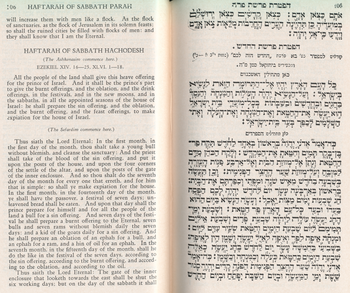
Back Haftarà Catalan Haftara CEB Haftara Czech Haftara Danish Haftara German Haftará Spanish Haftarah French הפטרה HE Haftarah ID Haftarah Italian




The haftara or (in Ashkenazic pronunciation) haftorah (alt. haftarah, haphtara, Hebrew: הפטרה) "parting," "taking leave"[1] (plural form: haftarot or haftoros), is a series of selections from the books of Nevi'im ("Prophets") of the Hebrew Bible (Tanakh) that is publicly read in synagogue as part of Jewish religious practice. The haftara reading follows the Torah reading on each Sabbath and on Jewish festivals and fast days. Typically, the haftara is thematically linked to the parashah (weekly Torah portion) that precedes it.[2] The haftara is sung in a chant. (Chanting of Biblical texts is known as "ta'amim" in Hebrew, "trope" in Yiddish, or "cantillation" in English.) Related blessings precede and follow the haftara reading.
The origin of haftara reading is lost to history, and several theories have been proposed to explain its role in Jewish practice, suggesting it arose in response to the persecution of the Jews under Antiochus IV Epiphanes which preceded the Maccabean Revolt, wherein Torah reading was prohibited,[3][4] or that it was "instituted against the Samaritans, who denied the canonicity of the Prophets (except for Joshua), and later against the Sadducees."[3] Another theory is that it was instituted after some act of persecution or other disaster in which the synagogue Torah scrolls were destroyed or ruined, as it was forbidden to read the Torah portion from any but a ritually fit parchment scroll, but there was no such requirement about a reading from Prophets, which was then "substituted as a temporary expedient and then remained."[5] The Talmud mentions that a haftara was read in the presence of Rabbi Eliezer ben Hurcanus, who lived c. 70 CE,[6] and that by the time of Rabbah bar Nahmani (the 3rd century) there was a "Scroll of Haftarot", which is not further described.[7] Several references in the Christian New Testament suggest this Jewish custom was in place during that era.[8]
- ^ Rabbi Samson Raphael Hirsch, The Hirsch Siddur (orig. German 1868, English transl. 1978 (1978, NY, Feldheim Publrs) page 339, "The term Haftarah, derived from פטר [feter], 'to dismiss' [as in 2nd Chron. 23:8] is the designation used.... It is the concluding portion of the Schaharith [morning] service, and marks the 'dismissal' of the congregation from the first part of the service, as it were."
Or feter can mean "to set free", as in 1st Chron. 9:33 and Prov. 17:14. Solomon Gaon, Minhath Shelomo: A Commentary on the Book of Prayer of the Spanish and Portuguese Jews (1990, NY, Union of Sephardic Congregations) page 147; Israel Abrahams, A Companion to the Authorised Daily Prayer Book (1922, rev. ed., London) pages clvi-clvii; Israel Abrahams, Studies in Pharisaism and the Gospels (1917, Cambridge Univ. Press, 1st series) page 4-5; it appears that in antiquity the Sabbath service ended with the haftarah so that the congregation was dismissed and free to go home. The word haftaro - הפטרה - is used in Midrash Rabbah of Genesis, sec. 69 (last paragraph), for "farewell speech". - ^ Goswell argues that the arrangement "suggests we should understand the books of Joshua - Kings as illustrating and applying the theology and ethics of the Pentateuch." Gregory Goswell, "The Hermeneutics of the Haftarot," Tyndale Bulletin 58 (2007), 100.
- ^ a b Rabinowitz, Louis (2007). "Haftarah". In Berenbaum, Michael; Skolnik, Fred (eds.). Encyclopaedia Judaica. Vol. 8 (2nd ed.). Detroit: Macmillan Reference. pp. 198–200. ISBN 978-0-02-866097-4.
- ^ Shlomo Katz, The Haftarah: Laws, Customs & History (2000, Silver Spring, Md.: Hamaayan/The Torah Spring) page 4.
- ^ Matthew B. Schwartz, Torah Reading in the Ancient Synagogue, Ph.D. dissertation, Wayne State Univ., 1975, page 181.
- ^ Tosefta, Megillah, 4 (3): 1, gives the haftarot for the Four Special Sabbaths. A baraita in Megillah 31a, which has later additions by the Babylonian amoraim who add the haftarot for the second days of the festivals (and who sometimes change the order of the haftarot as a result) – gives the haftarot for every one of the festivals, including their intermediate Sabbaths, as well as a Sabbath which is also Rosh Hodesh, the Sabbath which immediately precedes Rosh Hodesh, and Hanukkah.
- ^ Talmud Babli, Gittin 60a.
- ^ Acts 13:15 states that "after the reading of the law and the prophets" Paul was invited to deliver an exhortation. Luke 4:17 states that during the Sabbath service in Nazareth the Book of Isaiah was handed to Jesus, "and when he had opened the book, he found the place where it was written," the passage being Isaiah 61:1–2. Unfortunately, the Greek word used there meaning "found" does not make it clear whether the passage read was fixed beforehand or whether it was chosen at random. See Rabinowitz, Louis (2007). "Haftarah". In Berenbaum, Michael; Skolnik, Fred (eds.). Encyclopaedia Judaica. Vol. 8 (2nd ed.). Detroit: Macmillan Reference. pp. 198–200. ISBN 978-0-02-866097-4. Also Matthew B. Schwartz, Torah Reading in the Ancient Synagogue, Ph.D. dissertation, Wayne State Univ., 1975, page 184, "In fact, the selection must have been made beforehand.", The earliest source for evidence of haftarah readings is the New Testament, but it has been suggested that Jewish authorities following the New Testament period very deliberately avoided using as a haftarah any selection of the Prophets that had been mentioned in the New Testament. Hananel Mack, What happened to Jesus' haftarah? Haaretz, Aug. 12, 2005. But D. Monshouwer, The Reading of the Prophet in the Synagogue at Nazareth, Biblica, vol. 72, nr. 1 (1991) page 90-99, suggests that the quotation of Isaiah 61:1 is not a haftarah reading but the beginning of a sermon or homily, and suggests that the occasion was Yom Kippur.
© MMXXIII Rich X Search. We shall prevail. All rights reserved. Rich X Search